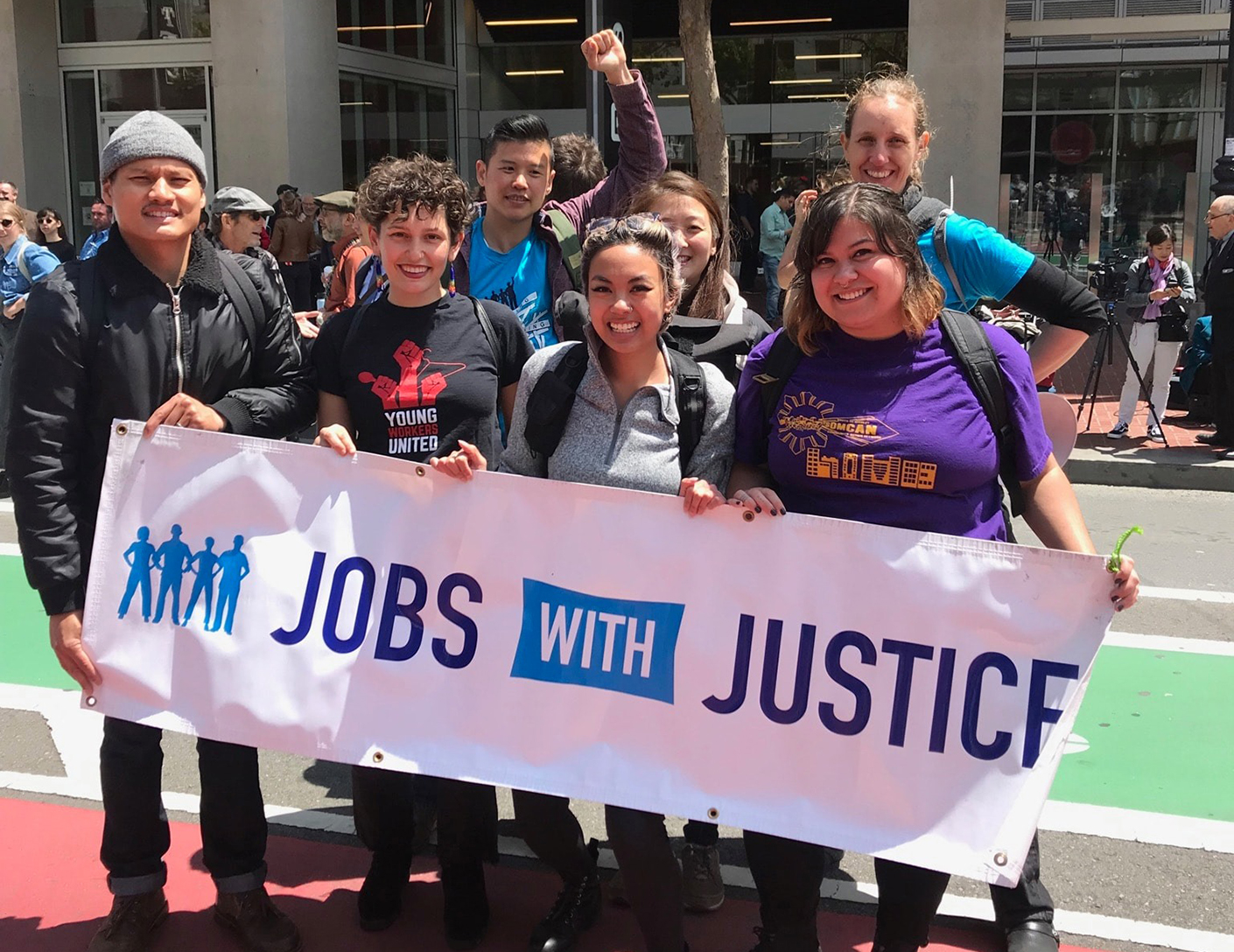When the pandemic hit last year, the fear amongst workers in San Francisco was palpable. They were afraid of losing their jobs, not having income to pay their bills, working in scary and unsafe conditions, but also afraid of taking time off, says Kung Feng, the executive director of Jobs with Justice San Francisco. As Feng watched COVID spread, he wondered how this would play out in San Francisco, and specifically how this unprecedented crisis would impact workers on the front lines.
Jobs with Justice San Francisco is an alliance of organizations that represent workers ranging from restaurant staff, custodians and teachers, and they have members who organize for parents, students, tenants, seniors, and people with disabilities. “Our philosophy is that we organize for the whole worker,” says Feng. “Worker issues go beyond the workplace and people have full lives.”
Pre-pandemic, Jobs with Justice San Francisco was already deeply engaged in the fight for workers and communities of color. In 2019, they fought for San Francisco’s low- and middle-income workers and won “Housing our Workers” legislation, which generated over $400 million in funding for affordable housing for workers and transitional housing for the homeless.
Recognizing the organization as a key player in the fight for economic inclusion in the Bay Area, the San Francisco Foundation began supporting Jobs with Justice San Francisco in 2017 and provided a Rapid Response Fund grant in March 2020. The emergency grant helped enable urgent worker organizing to protect the well-being of low-wage workers, workers of color, immigrant workers, and nontraditional workers, such as domestic workers and gig workers in the wake of the pandemic.
“Jobs with Justice advances change that improves pay and say of workers at their jobs and on issues that are important to the economic wellbeing and lives of their worker constituency,” says Jidan Terry-Koon, director of San Francisco Foundation’s People Pathway. “During the protests for Black Lives in 2020, Jobs with Justice boldly stood up as a labor voice and brought pressure on the Police Officers Association to not resist the changes that communities were fighting for.”
Jobs with Justice San Francisco’s 30+ member organizations include key players in the fight for worker rights, such as La Colectiva, Trabajadores Unidos Workers United, Mujeres Unidas y Activas, and Chinese Progressive Association. Their convenings pre-pandemic were put into overdrive last spring, setting up meetings with alliance members and allies, such as Gig Workers Rising, Faith in Action, and officials from the City of San Francisco, within days and meeting multiple times a week, and victories quickly followed.
In March 2020, UndocuFund San Francisco was created to provide critical aid to undocumented immigrant workers and their families. The fund raised $4.3 million to help 11,000 undocumented community members affected by the pandemic. “My husband and I were unable to work almost all of last year due to the pandemic,” says Maria, a restaurant cook who received critical aid from UndocuFund (we are not using her full name to protect her privacy). “When I received a check from UndocuFund, for the first time in months, I didn’t feel stressed about my family.”
In April 2020, Jobs with Justice San Francisco helped pass critical legislation for paid emergency leave, providing 200,000 workers with up to two weeks of paid leave. This victory led to regional partnerships and similar protections in other California cities.
That same month, Jobs with Justice San Francisco partnered with SF Supervisor Matt Haney to advocate for an extension of a temporary employee protections ordinance. With unrelenting advocacy from Jobs with Justice San Francisco, that ordinance has been extended five times during the pandemic, provided emergency health and safety protections to grocery, restaurant, and food delivery workers. Earlier this year in February, Jobs with Justice San Francisco helped make that temporary employee protection ordinance pass as a two-year ordinance in San Francisco that establishes stronger enforcements including coverage of food delivery workers, whether they are classified as employees or independent contractors as passed by the approval of Proposition 22 in 2020.
Despite the challenges of organizing during a pandemic that kept people apart, Jobs with Justice San Francisco and its members were able to virtually convene, strengthen their solidarity across sectors and diverse communities, and double down on its fight for the health and safety of workers in San Francisco.


